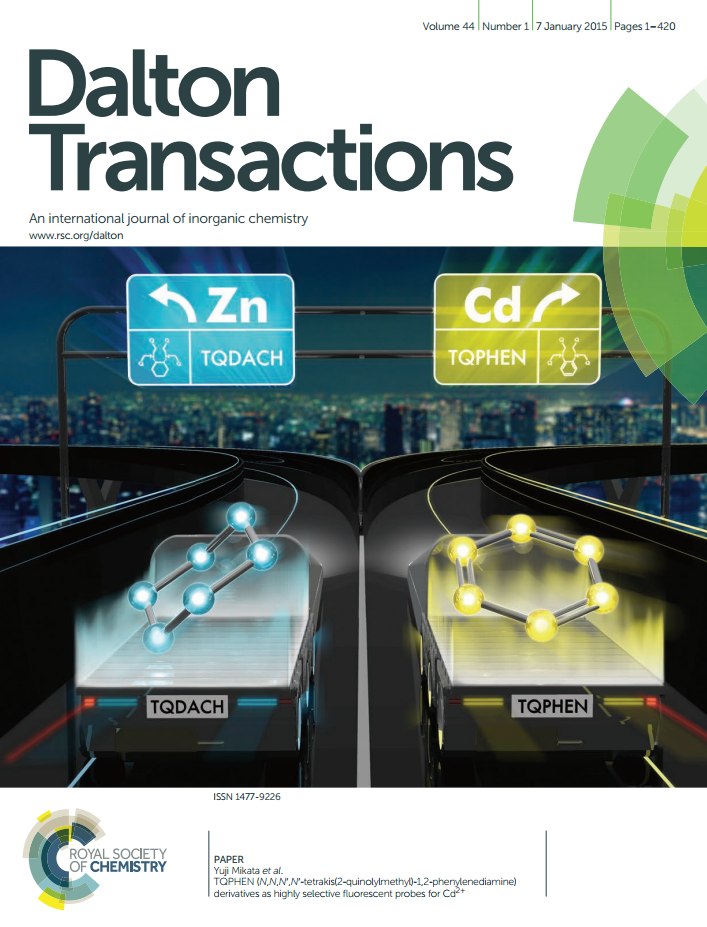 We are delighted to announce four new Dalton Transactions themed issues:
We are delighted to announce four new Dalton Transactions themed issues:
Metallodrugs: Activation, Targeting and Delivery
Deadline: 12th April 2016
Guest Editors: Professor Dr Nils Metzler-Nolte (Ruhr-Universität Bochum), Professor Dr Zijian Guo (Nanjing University)
In 1965, a seminal paper by Barnett Rosenberg appeared in Nature, describing the anti-proliferative properties of a very simple inorganic compound, now known to all of us as Cisplatin. This discovery, and the subsequent clinical approval of Cisplatin, has led to thousands of papers, and it has arguably initiated the field of medicinal inorganic chemistry. Now, 50 years after Rosenberg’s discovery, the field has matured and, beyond Cisplatin, many other compounds have been explored for their anti-proliferative activity. Moreover, chemical creativity has shifted from the mere discovery of new active agents, and elucidation of their mode of action (as difficult as that may be at times) to issues such as delivery of anti-proliferative agents to cancer cells, activation of inorganic prodrugs, and very creative approaches to targeting malignant cells exclusively.
A Themed Issue of Dalton Transactions now seeks to explore these frontiers in the art of medicinal inorganic chemistry. Crucially, the Issue will aim to provide an overview of current progress in three focal points of inorganic drug development: activation (for example, by light, enzymes or external stimuli), targeting (that is, bioconjugates, using the EPR effect, and so on) or selective delivery (to cancer cells or intra-cellularly, by nanoparticles or other carrier systems, and so on).
Although certainly important, the discovery of new compounds or elucidation of a mode of action are not topics for this issue — but Dalton Transactions is of course an excellent place for dissemination of such results in a regular Paper.
Small molecule activation
Deadline: 30th April 2016
Guest Editors: Professor Martin Albrecht (University of Bern), Professor Eric Clot (University of Montpellier), Professor Giulia Licini (University of Padova), Professor Barbara Milani (University of Trieste)
Small molecule activation constitutes one of the main frontiers of inorganic and organometallic chemistry, with much effort directed towards the development of new processes for the selective and sustainable transformation of abundant small molecules such as H2O, NH3, N2, O2, CO, or CO2 into high-value chemical feedstocks and energy resources.
This themed issue will focus on homogenously catalysed activation of small molecules, as well as stoichiometric reactions that further our understanding towards such ends. We invite submissions covering any relevant aspect of small molecule activation including: organometallic chemistry, (electro)catalysis, photochemistry, mechanistic studies, spectroscopy, synthesis, and developments in materials science.
Reactions Facilitated by Ligand Design
Deadline: 10th May 2016
Guest Editor: Professor Jason Love (The University of Edinburgh)
This issue will focus on transformations involving inorganic complexes where a ligand design approach has been used to produce a demonstrable change in reactivity. Papers can be submitted from any area of inorganic or organometallic chemistry, including catalysis, small molecule activation, C–X bond activation, bioinorganic chemistry and supramolecular chemistry. Ligand classes could include pincers, carbenes, macrocyclic ligands, phosphines or metallocenes, with approaches for goal-oriented ligand design involving aspects such as redox non-innocence, steric hindrance, secondary coordination sphere effects and manipulation of Lewis pairs.
Molecular Spintronics: The role of Coordination Chemistry
Deadline: 17th May 2016
Guest Editors: Professor Eugenio Coronado (University of Valencia), Professor Masahiro Yamashita (Tohoku University)
This issue intends to show the impact of coordination chemistry in the emerging field of Molecular Spintronics.
Coordination chemistry provides many examples of molecules that can be useful in this field: from metal complexes that can be incorporated into spintronic devices, as spin collectors or spin filters, to magnetic molecules that can behave as bits of memory or even as spin qubits.
This issue will cover the three different facets of the field, namely: 1) the use of molecules in the development of a new generation of spintronic devices; 2) the miniaturization of the device to reach the single-molecule limit (molecular nanospintronics); and 3) The search for molecular spin qubits of interest in quantum computing.
In this multidisciplinary field, chemists work in close interaction with solid-state physicists, including theoreticians as well as experimentalists, and materials scientists. Contributions coming from the three scientific communities in which these scientists are integrated – Spintronics, Molecular Electronics and Molecular Magnetism – are expected.
Does your research fit into any of these subject areas? If so, we would welcome your contribution. Please see below for further details on how to submit:
How to submit
All types of manuscript – communications, full papers and Perspectives, will be considered for publication. The manuscript should be prepared according to our article guidelines and submitted via our online system.
All manuscripts will be subject to normal peer review and inclusion in the themed issue will be at the discretion of the Guest Editors. Please indicate in your submission which themed issue you would like to be considered for.
Interested in submitting paper? Please contact us for more information










